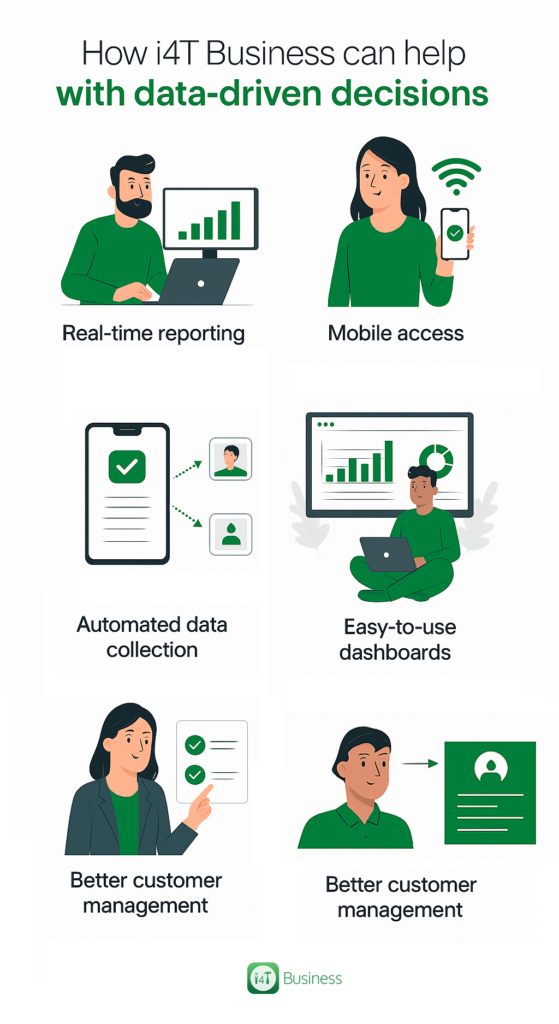These days, businesses everywhere are turning to data to guide their biggest decisions, and it’s not hard to see why. Having real numbers on hand helps them spot trends, solve problems faster, and plan for the future with more confidence.
It’s not just the big industries jumping on this trend either. Trade businesses like plumbing, electrical, and HVAC are realising that data isn’t just for corporate giants, it’s a powerful tool that can completely change the way they work.
Instead of relying on gut feeling or guesswork, data-driven decisions help trade businesses run smarter.
They can see where time and money are being wasted, find better ways to schedule jobs, manage inventory, price their services right, and even boost customer satisfaction.
In this post, we’ll break down why embracing data-driven decisions is one of the smartest moves you can make for the success and growth of your trade business.
What does data-driven decision-making mean for trade businesses?
When talking about “data-driven decision-making,” it’s about using real numbers, facts, and real-time insights to guide how you run your business. You should look at the information you already have, analyse it properly, and make smarter choices that help your business grow.
Tradies have often relied on experience and intuition to make decisions. While the experience is valuable, it’s not always enough. Data-backed decisions help you avoid the guesswork. Instead of thinking, “I feel like we’re doing fine,” you’ll know exactly how your business is performing, where you’re losing time or money, and what changes will actually make a difference.
Types of data that matter for trade businesses
To make good decisions, you need to know what kind of data to track. Here are the key types of data every trade business should be paying attention to:
Operational data
This covers how your day-to-day operations are running. Think about job completion times, how productive your technicians are, how accurate your scheduling is, and how often jobs get delayed. Tracking these numbers helps you find inefficiencies, like if a technician is consistently overbooked or jobs are taking longer than they should.
Customer data
Understanding your customers better is a huge advantage. Therefore, you should keep tabs on client preferences, common service requests, and the feedback you receive after jobs. Knowing what customers really want and what frustrates them will help you improve your services, boost customer satisfaction, and gain their loyalty.
Financial data
You should keep a close eye on your revenue, expenses, and cash flow. Are you pricing jobs correctly? Are you spending too much on overtime or supplies? Financial data gives you the insights you need to stay profitable and make smart investments.
Performance data
This type of data is all about the quality of your service. Metrics like how often you complete jobs on time, how accurate your work is, and how happy your customers are can show you where your team shines and where you need to tighten things up.
Key benefits of data-driven decisions for trade businesses
When making data-driven decisions is about looking at real insights and figures. It helps you to run your business smarter every single day. In short, data-driven decisions will put you in control, helping you stay ahead of industry changes and customer expectations.
Let’s dive deep and take a closer look at the biggest ways data-driven decision-making can help your trade business grow and thrive.
Improved efficiency and productivity
Let’s be real; time is money in the trade world. When you use data to guide your decisions, it becomes much easier to spot where your operations are slowing down. Maybe certain jobs always run over time, or maybe some technicians have lighter schedules while others are overloaded.
By analysing your operational data, you can figure out ways to make your workflow smoother, fix bottlenecks, and get your whole team to operate efficiently.
Plus, with job management software and smart scheduling tools, you can allocate your resources better, sending the right technician to the right job, at the right time. It will help you to cut down on technician idle time, travel time between jobs, and unnecessary labour costs.
Cost reduction and profit maximisation
It’s tough to grow your business if you’re constantly losing money without knowing where it’s going. That’s where real time data can be a huge help. By analysing your financial and operational numbers, you can easily pinpoint where you’re overspending or running inefficiently.
For example, you might find out you’re paying for equipment you rarely use or keeping extra staff on during slow months. With that insight, you can adjust staffing, renegotiate supplier deals, or optimise how you use your resources.
Enhanced customer satisfaction
Happy customers are the backbone of a strong trade business. When you track customer data like service preferences, feedback, and request patterns, you can deliver a personalised service for each client.
Whether it’s sending reminder messages, offering a special discount on their most-used service, or simply responding faster to requests, little things can make a huge difference. The plus side of this is that you will get loyal customers, more repeat jobs, glowing reviews, and plenty of referrals that help your business grow without spending extra on marketing.
Better strategic planning and forecasting
Planning for the future is tough when you are relying only on guesswork. However, with solid historical data on your side, you can start spotting trends early. For example, which months get crazy busy, which services are growing in demand, and when it’s time to scale up?
Good forecasting helps you prepare marketing campaigns, hire seasonal staff when needed, manage inventory smarter, and avoid last-minute scrambles.
How to collect and analyse data for trade businesses
Collecting data sounds like a big job, but with the right tools and a clear plan, it’s easier than you might think. The real magic happens when you gather the right information, focus on the numbers that matter, and use simple tools to make sense of it all. Here’s how you can start collecting and analysing data to make smarter, faster decisions for your trade business.
Implementing technology to capture data
First things first, if you want to make smarter decisions, you need a steady flow of good data. That’s where technology steps in.
Today’s field service management software and job management tools can automatically collect important information from your technicians, customers, and daily operations, without adding any extra work for you.
Using these software solutions, you can also easily track everything from job updates and customer feedback to technician performance and invoicing records. Instead of digging through paperwork or relying on memory, you’ll have everything neatly stored and ready to analyse when you need it.
The best part is that most modern tools have mobile applications, so your field team can input updates right from the job site, keeping your data fresh and accurate.
Choosing the right Key Performance Indicators (KPIs)
Collecting data is great, but knowing what to measure is even more important. That’s where KPIs (Key Performance Indicators) come in. KPIs are the specific numbers that tell you how your business is doing.
You want to pick KPIs that line up with your business goals. For example:
- If you want to boost efficiency, track job completion times and technician productivity.
- If customer satisfaction is your focus, measure customer satisfaction scores or repeat job rates.
- If profitability is the goal, monitor profit margins and cost per job.
The key is to focus on actionable metrics like numbers that give you clear signals about what’s working and what needs fixing.
Data analysis tools and software
Once you’ve collected the right data and identified your KPIs, it’s time to make sense of it all. That’s where data analysis and visualisation tools come in handy.
Platforms like Google Analytics, Power BI, and specialised trade industry software can help you turn raw data into easy-to-read charts, graphs, and reports. You can quickly spot trends, find patterns, and make decisions based on solid insights instead of hunches.
For trades businesses, there are even job management solutions like i4T Business that come with built-in reporting dashboards, making it super easy to monitor your KPIs without getting overwhelmed.
When you have the right tools in place, analysing your data becomes part of your routine and not an extra chore. That’s when you’ll start to see the power of data-driven decision-making in action.
Overcoming challenges in adopting data-driven decision making
While data-driven decision-making has various benefits, getting there isn’t always smooth sailing. Many trade businesses run into a few common challenges when trying to shift to a more data-focused approach.
The good news is that with the right strategies, you can overcome these hurdles and set your business up for long-term success. Let’s take a look at some of the biggest roadblocks that you will face and how to tackle them successfully.
Resistance to change
Let’s be honest, change isn’t always easy, especially when your team is used to doing things a certain way. Some staff or even management might be skeptical about shifting from old-school methods to a data-driven approach. They might wonder, “Why is it necessary to fix something that isn’t broken?”
The best way to tackle this resistance is through clear communication and support. Show your team how data can actually make their jobs easier and not harder.
Offer simple training sessions to help them get comfortable with new tools. Make sure leadership is fully on board, too, setting the tone from the top. Most importantly, celebrate early wins. Once your team sees real improvements, like faster job scheduling or fewer customer complaints, they’ll be much more open to embracing the change.
Data quality and accuracy
Collecting data is one thing, but if the data isn’t accurate, it can quickly lead you in the wrong direction. Outdated or incorrect data can lead to poor decisions that hurt your business instead of helping it.
That’s why it’s crucial to keep your data clean and reliable. Set up regular audits to double-check the information your systems are collecting. Make sure technicians and staff are trained to input data correctly and consistently. You can also use software that flags incomplete or suspicious entries, making it easier to catch mistakes early.
Good decisions start with good data, so it’s worth taking a little extra time to make sure what you’re working with is trustworthy.
Cost of implementation
There’s no denying that setting up the right tools and systems to support data-driven decision-making can come with an upfront cost. Investing in field service management software, mobile applications, or CRM platforms might feel like a big spend at first, especially if you’re used to working manually.
But here’s the thing, the long-term payoff is huge. When you improve the scheduling function, reduce wasted hours, cut unnecessary spending, and deliver better service, the savings and extra revenue will quickly add up. Plus, smarter decision-making helps you avoid costly mistakes and keeps your business growing steadily.
How i4T Business can help with data-driven decisions

At the end of the day, it all comes down to running a business that makes money without wasting time or resources. That’s exactly what locksmith software helps you do.
Switching to data-driven decision-making sounds great. It’s even better when you have the right tools to back you up. That’s where i4T Business steps in. It’s built specifically to make life easier for trade businesses that want to work smarter, not harder. Here’s how i4T Business helps you make smarter decisions:
Real-time reporting
You can see up-to-the-minute reports on job progress, technician performance, customer feedback, and financials, all in one place. No more waiting for end-of-month spreadsheets to figure out what’s going on.
Mobile access
Whether you’re at the office, on the road, or at a job site, you can pull up all the data you need straight from your phone or tablet. Mobile access helps to make faster decisions, improve communication, and minimise downtime.
Automated data collection
i4T Business automatically gathers and updates data from your jobs, customers, inventory, and finances as you work. You don’t have to deal with extra paperwork, no lost information, and no need to chase up team members for updates.
Easy-to-use dashboards
You don’t need to be a data expert to understand what’s happening in your business. i4T Business turns raw numbers into simple, visual dashboards so you can quickly spot trends, track KPIs, and make changes when needed.
Better customer management
With built-in CRM tools, you can keep track of client preferences, service history, and feedback, helping you deliver a more personalised, satisfying experience that keeps customers coming back.
Final thoughts: Embracing data for long-term business success
At the end of the day, running a successful trade business isn’t just about working hard; it’s about working smart. And that’s exactly what data-driven decision-making helps you do. By using real numbers and insights, you can streamline your operations, reduce unnecessary costs, deliver better service, and plan for long-term growth with a lot more confidence.
The trade industry is changing fast, and businesses that embrace technology and data analysis now will be the ones leading the way tomorrow.
Tapping into your business data gives you a serious edge over the competition, whether it’s improving job scheduling, managing your team more efficiently, or making smarter financial moves.
The good news is that you don’t have to figure it all out on your own. With the right tools like i4T Business in place, making data-backed decisions becomes easier, faster, and a lot more effective.
Get in touch with us today and start a free trial of i4T Business. See firsthand how our solutions can help you make smarter, faster choices that drive real results!
FAQs
It helps you make smarter, faster choices that improve efficiency, cut costs, and boost profits over time.
It shows trends like job durations and technician availability, helping you schedule jobs more accurately and efficiently.
Absolutely! Even tracking a few key numbers can make a huge difference in daily operations and growth.
It highlights strengths and weaknesses, helping you reward top performers and provide support where needed.
Real-time data helps you react quickly to issues like delays, customer complaints, or scheduling gaps.
Hot off the press!

Field Service Management sector operates, the i4TGlobal Team loves to share industry insights to help streamline your business processes and generate new leads. We are driven by innovation and are passionate about delivering solutions that are transparent, compliant, efficient and safe for all stakeholders and across all touch points.




